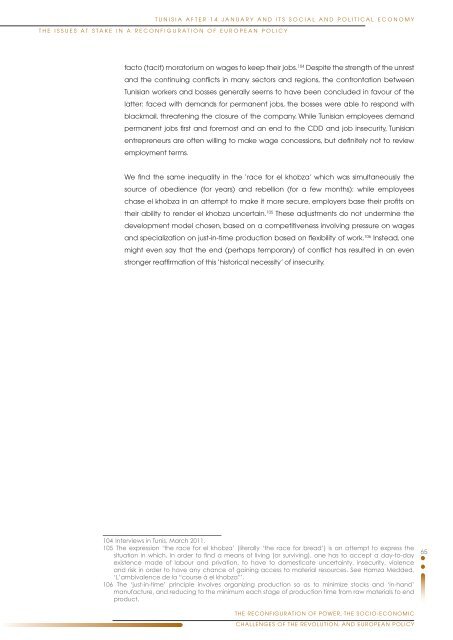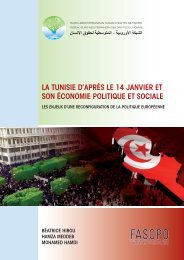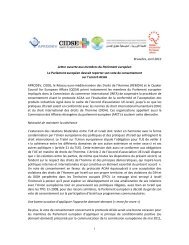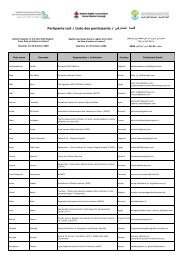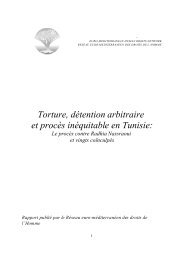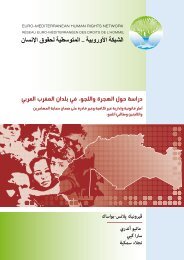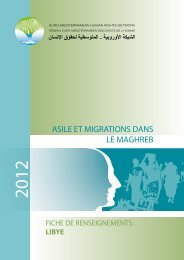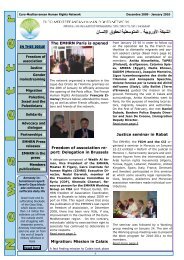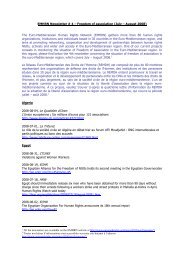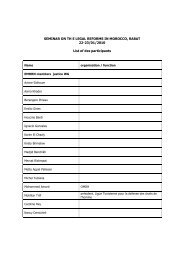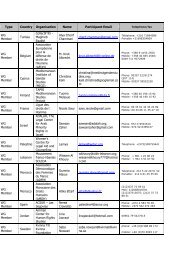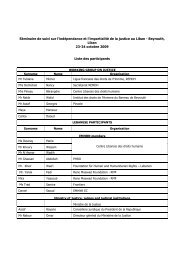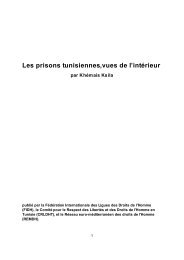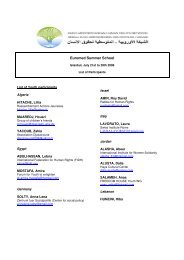such zones, it is not only the nature of the employment contract which is the source ofinsecurity, it is the difficulty employees face in setting up trade unions <strong>and</strong> defending theirmost basic rights. Since the amendments of the Labour Code of 1994 <strong>and</strong> 1996 <strong>and</strong> theintroduction of fixed term contracts (contrats à durée déterminée - CDD), the proportionof temporary jobs has climbed rapidly: of the unemployed who lost their jobs, 41 percentwere in this situation because their contract had run <strong>its</strong> course. In free zones, the onlypossible contract is the CDD.Similarly, lower labour costs in Tunisia have already been in force for years, <strong>and</strong> theguidelines required by integration in neoliberal globalization (<strong>and</strong> transmitted byEuropean dem<strong>and</strong>s) do not take this situation into account. The income of a father onthe guaranteed minimum wage has deteriorated significantly. Composed of the latter’swages, but also of family allowances, the single wage allowance (when his wife is notworking, which is usually the case) <strong>and</strong> other allowances, this set of revenues experienceda significant decline, mainly because of lower benefit levels. It follows that, on average,between 1983 <strong>and</strong> 2006, the loss of purchasing power of a father of three children on theminimum wage has amounts to over 86 dinars per month.The magnitude of the pressure on wages has been implicitly recognized through theincreases awarded by entrepreneurs in the <strong>after</strong>math of <strong>14</strong> January. But while theseadjustments certainly improve the lives of the wage-earners affected, they are notgeneral. They mainly concern the offshore sector, in which reactions have been varied,depending mainly on the economic situation of the companies involved. Many of themhave given in to dem<strong>and</strong>s <strong>and</strong> some had even anticipated them by announcing salaryincreases immediately <strong>after</strong> January <strong>14</strong>, precisely in the hope of avoiding creatingpermanent jobs. 101 They had calculated the cost in euros of these salary increases,<strong>and</strong> had considered them to be insignificant compared to the benef<strong>its</strong> provided bythe proximity of Tunisia to Europe, as was openly stated by the acting President of theUTICA: ‘Wage dem<strong>and</strong>s are negligible when converted into euros.’ 102 Other companies,certainly those which were already in a bad position <strong>and</strong> close to leaving, have ‘takenadvantage’ of claims to close down <strong>and</strong> announce their relocation: in this way, Tunisiahas lost between 10,000 <strong>and</strong> 15,000 jobs. 10364In the onshore sector, it is mainly officials who have dem<strong>and</strong>ed wage increases, startingwith the police who got a hike of up to 150 TD per month, or employees of publicenterprises such as Tunis Air or urban transport companies. While some permanentjobholders obtained wage increases, some of the less secure dem<strong>and</strong>ed that their jobsbe made permanent: 100,000 caretakers <strong>and</strong> cleaners are negotiating their integrationinto the civil service. The st<strong>and</strong>off in the private sector just <strong>after</strong> the fall of Ben Ali has stalled<strong>and</strong> employees have preferred to save their situation, some employees protecting ‘their’factories with clubs, <strong>after</strong> <strong>14</strong> January amid the security chaos, <strong>and</strong> most accepting a de101 Interviews in Tunis <strong>and</strong> the industrial zone of Grombalia, March 2011.102 Marie Christine Corbier, ‘Tunisie, le temps des colères <strong>social</strong>es’, www.lesechos.fr, accessed on 7.3.2011.103 Ibid., <strong>and</strong> interviews in Tunis, March 2011.
T U N I S I A A F T E R 1 4 J A N U A R Y A N D I T S S O C I A L A N D P O L I T I C A L E C O N O M YT H E I S S U E S A T S T A K E I N A R E C O N F I G U R A T I O N O F E U R O P E A N P O L I C Yfacto (tacit) moratorium on wages to keep their jobs. 104 Despite the strength of the unrest<strong>and</strong> the continuing conflicts in many sectors <strong>and</strong> regions, the confrontation betweenTunisian workers <strong>and</strong> bosses generally seems to have been concluded in favour of thelatter: faced with dem<strong>and</strong>s for permanent jobs, the bosses were able to respond withblackmail, threatening the closure of the company. While Tunisian employees dem<strong>and</strong>permanent jobs first <strong>and</strong> foremost <strong>and</strong> an end to the CDD <strong>and</strong> job insecurity, Tunisianentrepreneurs are often willing to make wage concessions, but definitely not to reviewemployment terms.We find the same inequality in the ‘race for el khobza’ which was simultaneously thesource of obedience (for years) <strong>and</strong> rebellion (for a few months): while employeeschase el khobza in an attempt to make it more secure, employers base their prof<strong>its</strong> ontheir ability to render el khobza uncertain. 105 These adjustments do not undermine thedevelopment model chosen, based on a competitiveness involving pressure on wages<strong>and</strong> specialization on just-in-time production based on flexibility of work. 106 Instead, onemight even say that the end (perhaps temporary) of conflict has resulted in an evenstronger reaffirmation of this ‘historical necessity’ of insecurity.104 Interviews in Tunis, March 2011.105 The expression ‘the race for el khobza’ (literally ‘the race for bread’) is an attempt to express thesituation in which, in order to find a means of living (or surviving), one has to accept a day-to-dayexistence made of labour <strong>and</strong> privation, to have to domesticate uncertainty, insecurity, violence<strong>and</strong> risk in order to have any chance of gaining access to material resources. See Hamza Medded,‘L’ambivalence de la “course à el khobza”’.106 The ‘just-in-time’ principle involves organizing production so as to minimize stocks <strong>and</strong> ‘in-h<strong>and</strong>’manufacture, <strong>and</strong> reducing to the minimum each stage of production time from raw materials to endproduct.65The reconfiguration of power, the socio-economicchallenges of the revolution, <strong>and</strong> European policy


